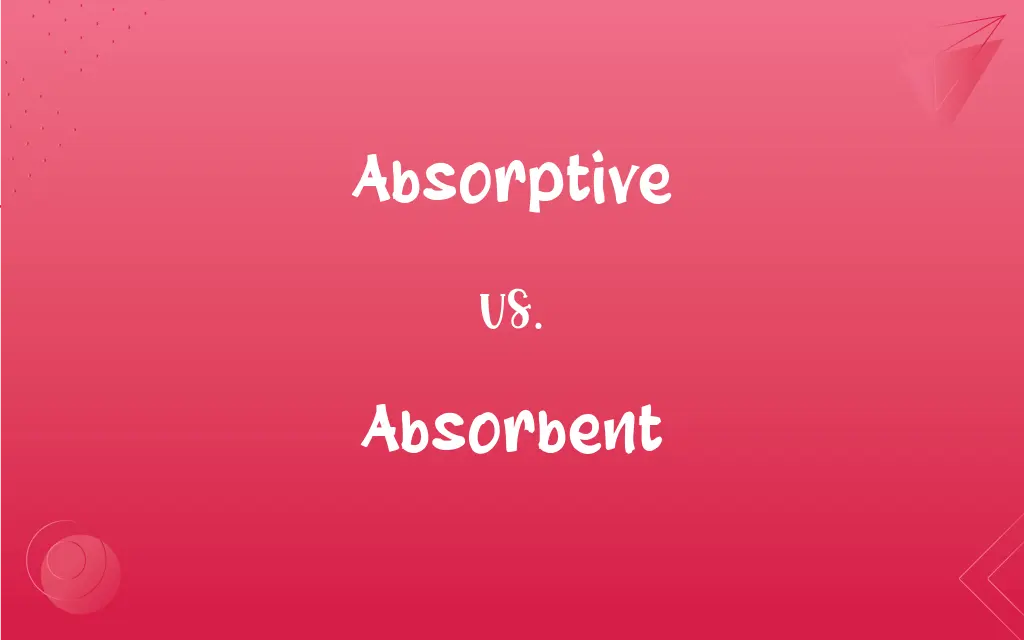Absorptive vs. Absorbent: What's the Difference?
By Janet White || Updated on February 15, 2024
Absorptive refers to the ability of a material to take in and retain a substance, while absorbent describes a material that can soak up liquids or gases.

Key Differences
Absorptive and absorbent are two terms that are often used interchangeably, but they have distinct meanings. Absorptive refers to the capacity of a material to take in and retain a substance, such as a sponge absorbing water. It is a property that describes how well a material can incorporate a substance into its structure. On the other hand, absorbent describes a material that can soak up liquids or gases. It is a characteristic of materials that can quickly take in and hold a substance, often on their surface. An absorbent material, like a paper towel, is effective in picking up spills because it can rapidly draw the liquid into its fibers.
Both terms are related to the process of absorption, but they highlight different aspects of it. Absorptive is more about the ability to incorporate and retain, while absorbent focuses on the capacity to take in and hold. For example, a sponge is both absorptive and absorbent; it can take in water and retain it within its structure.
In some contexts, the distinction between these terms is subtle, and they may be used interchangeably. However, in scientific and technical fields, the difference can be more significant. For example, in pharmacology, a drug's absorptive properties are important for understanding how it is taken up by the body, while the absorbent properties of a material might be more relevant in the context of wound care.
Absorptive and absorbent are closely related, they emphasize different aspects of the process of absorption. Absorptive is about the ability to take in and retain a substance, while absorbent describes the capacity to quickly soak up a substance.
Comparison Chart
Definition
Ability to take in and retain a substance
Ability to soak up liquids or gases
ADVERTISEMENT
Focus
Incorporation and retention of substances
Rapid intake and holding of substances
Application
Often used in scientific contexts
Commonly used in everyday language
Example Materials
Activated carbon, clay
Paper towels, sponges
Relevance
Important in pharmacology, chemistry
Crucial in cleaning, spill management
Absorptive and Absorbent Definitions
Absorptive
Having a high absorption capacity.
The absorptive nature of the soil affects its fertility.
ADVERTISEMENT
Absorbent
Having a high capacity for absorption.
The absorbent nature of the sponge makes it ideal for cleaning spills.
Absorptive
Involving the assimilation of ideas.
An absorptive mind quickly grasps new concepts.
Absorbent
Used to absorb substances.
Absorbent materials are essential in spill kits.
Absorptive
Relating to absorption.
The absorptive properties of a material determine how well it can retain moisture.
Absorbent
Able to take in moisture.
An absorbent fabric keeps the skin dry.
Absorptive
Capable of taking in substances.
An absorptive membrane allows certain molecules to pass through.
Absorbent
Designed for absorption.
Absorbent pads are used in diapers to prevent leaks.
Absorptive
Pertaining to the absorption of energy.
An absorptive surface reduces glare by trapping light.
Absorbent
Capable of soaking up liquids.
An absorbent towel quickly dries wet surfaces.
Absorptive
The act or process of absorbing or the condition of being absorbed.
Absorbent
Capable of absorbing a liquid or gas
Absorbent cotton.
Absorptive
A state of mental concentration.
Absorptive
Having power, capacity, or tendency to absorb or imbibe; absorbent.
Absorptive
Any substance that absorbs.
Absorptive
Having power, capacity, or tendency to absorb or imbibe.
Absorptive
Having power or capacity or tendency to absorb or soak up (liquids);
As absorbent as a sponge
FAQs
Can a material be both absorptive and absorbent?
Yes, a material like a sponge can be both absorptive and absorbent.
Are absorptive properties important in medicine?
Yes, absorptive properties are important in understanding how drugs are taken up by the body.
What is an example of an absorptive process in nature?
The absorption of nutrients by plant roots is an example of an absorptive process.
What does absorptive mean?
Absorptive refers to the ability of a material to take in and retain a substance.
How do absorptive and absorbent differ in usage?
Absorptive is often used in scientific contexts, while absorbent is commonly used in everyday language.
What is an example of an absorbent material?
Paper towels are a common example of an absorbent material.
What does absorbent mean?
Absorbent describes a material that can soak up liquids or gases.
What factors affect the absorbent properties of a material?
Factors like porosity, surface area, and material composition affect absorbent properties.
Can absorptive capacity be measured?
Yes, absorptive capacity can be measured using various scientific methods.
How do manufacturers enhance the absorbent properties of products?
Manufacturers can enhance absorbent properties by using materials with high porosity and surface area.
Can absorptive properties change over time?
Yes, the absorptive properties of a material can change due to factors like aging or exposure to chemicals.
What role do absorptive materials play in agriculture?
Absorptive materials like soil can retain water and nutrients, affecting plant growth.
Are there materials that are highly absorptive but not very absorbent?
Yes, some materials can retain substances without quickly soaking them up.
How do absorbent materials help in cleaning spills?
Absorbent materials quickly soak up liquids, making them effective for spill management.
Are there any health risks associated with absorptive materials?
Some absorptive materials, like certain chemicals, can pose health risks if not handled properly.
How do absorbent materials impact waste management?
Absorbent materials can help contain and manage liquid waste, reducing environmental impact.
Are there any innovative uses for absorptive or absorbent materials?
Yes, there are innovative uses such as in water purification systems, energy storage, and smart textiles.
What is the role of absorbent materials in personal care products?
Absorbent materials are used in products like diapers and sanitary pads to prevent leaks.
How do absorptive and absorbent materials differ in their environmental impact?
The environmental impact varies depending on the material's composition and how it's disposed of or recycled.
Is absorptive capacity important in environmental science?
Yes, understanding the absorptive capacity of materials is important in pollution control and water treatment.
About Author
Written by
Janet WhiteJanet White has been an esteemed writer and blogger for Difference Wiki. Holding a Master's degree in Science and Medical Journalism from the prestigious Boston University, she has consistently demonstrated her expertise and passion for her field. When she's not immersed in her work, Janet relishes her time exercising, delving into a good book, and cherishing moments with friends and family.































































